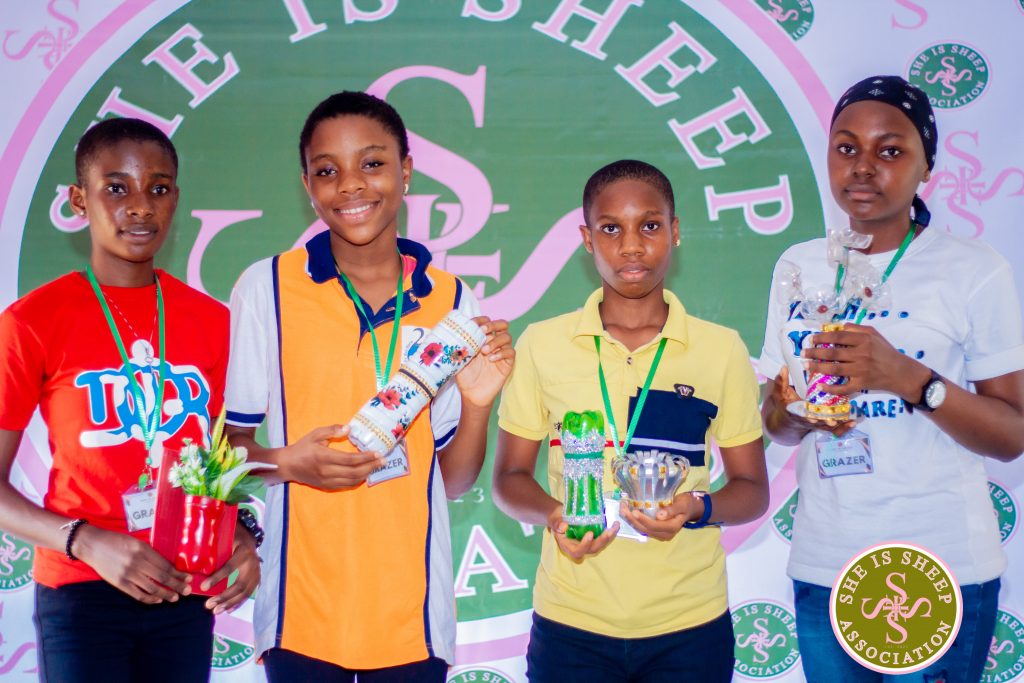
Hey Sheep!
Did you know that only 9% of plastics are recycled globally according to the Organization for Economic Co-operation and Development (OECD) although we touch, feel, see, inhale and consume plastic every day?
What are plastics?
Plastics are synthetic materials made from a wide range of organic polymers. They are non-biodegradable in nature and may take up to 1000 years to biodegrade.
At the mention of plastics we assume that the first images that come to mind are that of disposable plastic cups and plates, plastic straws, plastic cutleries (spoons and forks), shopping polythene bags, plastic water bottles, plastic food/gift wraps and a lot more.
Plastics are durable and long-lasting materials. However, have we ever wondered about what happens to them whenever they are disposed after a single-use? Have we ever wondered about what threats they pose to the society and how harmful they are to life? Remember we said they are non-biodegradable materials right?
So, I found out that according to a study by Eunomia in 2016, 12 million tons of plastic pollution (excess plastic in the environment) ends up in our ocean annually. WOW!
The effects of plastic pollution are life-threatening – they cause air, land, and water pollution, including food poisoning.
For example, people who directly or indirectly consume plastics by exposure to plastic fibers at their places of work or through consumption of marine life e.g., fish, sea snails or shrimps that have been exposed to plastic pollution (e.g a fish that mistook and consumed plastic for food), such people are likely to suffer from life threatening diseases such as cancer or chronic lung disease.
Another major effect of plastic pollution is their indirect effect on atmospheric oxygen. 70% of atmospheric oxygen comes from marine life, when marine bodies get polluted by plastics it also leads to the death of marine plants, thereby causing a shortage of atmospheric oxygen which is harmful to us humans.
On land, it destroys the quality of soil and leads to poor harvest of crops and food scarcity eventually. As people who rely on our agricultural produce for food consumption predominantly it is shocking that we are not being sensitized enough on the topic, the reduction and elimination of plastic pollution must be taken as a priority. With a growing population and an increase in the quality of soil this becomes a recipe for food shortage.
Plastic pollution degrades the ecosystem, destroys natural habitats rendering the benefits of nature almost impossible to attain and, remember, the Holy Bible says to take care of the earth (Gen 2:15).
As an eco-friendly organization, we at She Is Sheep Association are strongly against plastic pollution. We believe it is everyone’s duty to take responsibility for the environment of which we inhabit. Environmental care is Self Care too!
The following are steps on how to reduce plastic pollution:

It’s time we save our ecosystem—it’s time we stop the menace of plastic pollution! We can reduce plastic pollution by simply following the 5R’s – refuse, replace, reduce, reuse and recycle.
- Refuse: by refusing to accept single-use plastics when offered at shopping centers. For example, we can get a quality shopping bag instead of buying dozens of polythene bags when we go shopping. We can refuse to get extra nylon bags for already packaged goods and instead put them in our handbags.
- Replace : by replacing plastic bags, cups, plates, straws e.t.c with paper or recyclable materials (based on which is suitable).
- Reduce: reduce plastic pollution by swapping single-use plastic materials for reusable ones.
- Reuse: plastics are non-biodegradable. Even when we burn them, they remain on the land and affect the land, water, and air we breathe in. We should inculcate the habit of reusing plastics. Reuse plastic water bottles, plates, cups, and the likes. We have to remember that these plastics are likely to lie around on earth for the next 700 — 1000 years, so let’s not be hasty in disposal of these plastics.
- Recycling: checking and separating waste is another effective way to reduce plastic pollution. Checking to know which waste can be recycled and which cannot will go a long way in saving our ecosystem. The good news is that recycling on its own is very profitable and can be used to earn a living.
Furthermore, recycled plastics are used to create/produce better, more durable and long-lasting advanced materials — even in the oil sector. Companies use recycled materials in construction industry, fashion and textile etc.
Dear Sheep,
It’s time to get proactive. We’ve got to become more intentional about our climate! We need to be climate conscious to save us and our unborn generation from the harsh reality of living without the shield of mother nature. Climate change is real and what we do everyday counts. At SISA we advice people to take a stand towards protecting the environment by starting to change little habits in our daily lives – the war on climate change does not have to be seen from a superhero perspective of saving the world, but, we can get one step closer to saving the world by first, saving your home. Do something today in your home and with your family to encourage healthy attitudes towards protecting our precious environment.
At She Is Sheep Association, we are pleased to let you know that we are partnered with “Plasticultured” a net zero plastic waste company focused on creating a community centered around the development of a culture that encourages better attitudes towards the environment by reducing plastic use. We hope that you have learned a thing or two from this post and will begin to do something today.
Endeavor to do the same.
Thanks and God bless you.
#SheIsSheepAssociation
#Climatechange
#OurEcosystem
#Plasticultured

